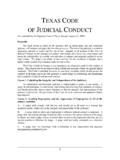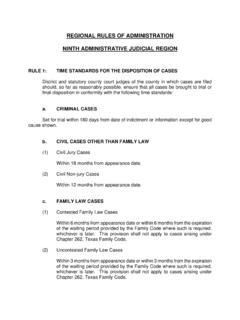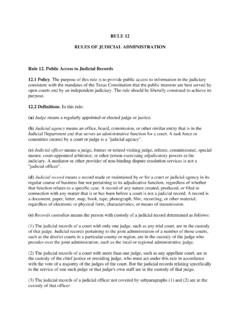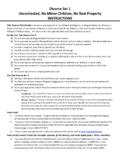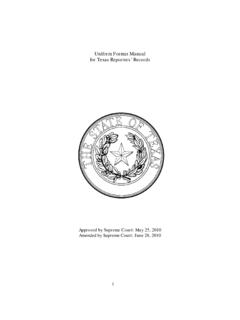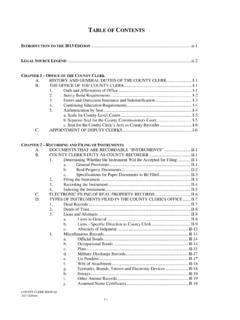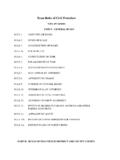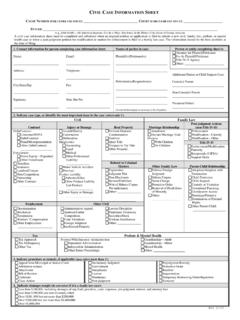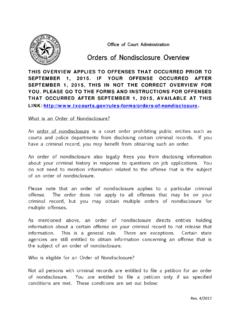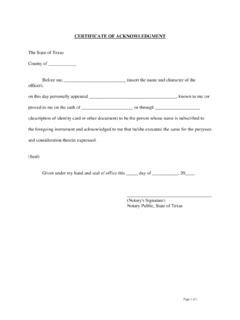Transcription of Judicial Branch Certification Commission Criminal History ...
1 Judicial Branch Certification Commission Criminal History guidelines ( effective January 23, 2015). These guidelines are issued by the Judicial Branch Certification Commission (hereinafter JBCC . or Commission ), pursuant to TEXAS GOVERNMENT CODE, Title 2, Subtitle L, Chapters 151 through 157. These guidelines describe the process used by the JBCC to determine whether a Criminal offense indicates that an applicant lacks the honesty, trustworthiness, or integrity to hold the Certification , or whether an offense warrants revocation or suspension of a current Certification . These guidelines also present the general factors considered in all cases and the categories of crimes that are considered to relate to each type of Certification issued by the JBCC.
2 (Note: in addition to Certification of court reporters, guardians, and process servers, the JBCC issues licenses to licensed court interpreters and registers court reporting firms. These guidelines apply to all certifications , licenses, and registrations issued by the JBCC, but for convenience, the guidelines refer to Certification . ). I. Commission Process Applications for Certification require the applicant to provide information about Criminal offenses, if any. JBCC's Certification Division also runs a state and national Criminal background check on each Certification application using the Texas Department of Public Safety (DPS) system.
3 When the application or the DPS background check reveals a Criminal offense, the committee comprised of Certification Division staff that reviews Criminal histories may request further information from the applicant in order to make a determination. If the offense is not a basis for denying the application, then the committee approves the completed application. If it is a basis for denying the application, the committee reviews the Criminal offense with reference to the applicable statutory provisions and these guidelines . If the committee determines that the application should be denied due to the Criminal offense, a letter from the Certification Division Director (the Administrative Director's designee) explaining the denial is mailed to the applicant.
4 The letter clearly identifies the offense(s) that forms the basis for the denial, cites the statutory authority for the denial, and advises the applicant that he or she may request, within twenty (20) days of the date of the denial, to have the decision reconsidered by the Commission . The letter also informs the applicant that his or her request must be in writing and identify each point or matter of the decision to be reconsidered. At its next regularly scheduled meeting, the Commission must consider the request and may allow the applicant or other witnesses to appear at the meeting and present sworn testimony.
5 The Commission 1. may limit the number of witnesses appearing and the time allotted for a witness' testimony. After it has reconsidered the applicant's request, the Commission may either affirm or reverse the decision to deny the application. The Commission must notify the applicant in writing of its decision on reconsideration. The Commission 's decision is final and may not be appealed. II. General Factors In making a determination whether a Criminal offense indicates that an applicant lacks the honesty, trustworthiness, or integrity to hold the Certification , or whether an offense warrants revocation or suspension of a current Certification , the Commission or Certification Division Director (the Administrative Director's designee) shall consider the following factors in addition to the guidelines stated in IV below: 1.
6 The nature and seriousness of the crime;. 2. The extent to which Certification , registration, or licensing might offer an opportunity to engage in further Criminal activity of the same type as that in which the person previously had been involved;. 3. The relationship of the crime to the ability, capacity, or fitness required to perform the duties and discharge the responsibilities of the occupation;. 4. The extent and nature of the person's past Criminal activity;. 5. The age of the person when the crime was committed;. 6. The amount of time that has elapsed since the person's last Criminal activity.
7 7. The conduct and work activity of the person before and after the Criminal activity;. 8. Evidence of the person's rehabilitation or rehabilitative effort while incarcerated or after release; and 9. Other evidence of the person's fitness, including, but not limited to, letters of recommendation. The Commission or Certification Division Director may also consider the proof provided by the applicant under IV below. III. Types of Certification and Crimes These guidelines reflect the most common or well-known categories of crimes. The vast majority of Criminal offenses reviewed by the Commission will fit within the categories of crimes described below.
8 However, these guidelines are not intended to be an exclusive listing and do not prohibit the JBCC from considering crimes not listed below. After due consideration of the circumstances of the Criminal act and 2. the general factors listed above, the Commission may find that an offense not described below is sufficient to deny, revoke, or suspend a Certification . In addition to the specific crimes listed below, multiple violations of any Criminal statute will always be reviewed for any type of Certification . Multiple violations may reflect a pattern of behavior indicating that an applicant lacks the honesty, trustworthiness, or integrity to hold the Certification .
9 COURT REPORTING. Crimes against the person such as assaultive offenses, kidnapping and murder. Crimes involving prohibited sexual conduct or involving children, the elderly, or disabled persons as victims. Crimes involving dishonesty, fraud, deceit, misrepresentation, deceptive business practices, or obstruction of justice. Crimes involving tampering with government documents. Crimes involving drug related offenses. Crimes involving deliberate violence. GUARDIANSHIP Certification . Crimes against the person such as assaultive offenses, kidnapping and murder. Crimes involving prohibited sexual conduct or involving children, the elderly, or disabled persons as victims.
10 Crimes involving dishonesty, fraud, misrepresentation, deceptive business practices, or misapplication of fiduciary property. Crimes involving tampering with government documents. Crimes against property such as theft or burglary. Crimes involving alcohol and drug related offenses. Crimes involving deliberate violence. PROCESS SERVER Certification . Crimes against the person such as assaultive offenses, kidnapping and murder. Crimes involving prohibited sexual conduct or involving children, the elderly, or disabled persons as victims. 3. Crimes involving dishonesty, fraud, misrepresentation, deceptive business practices, misapplication of fiduciary property, or obstruction of justice.
